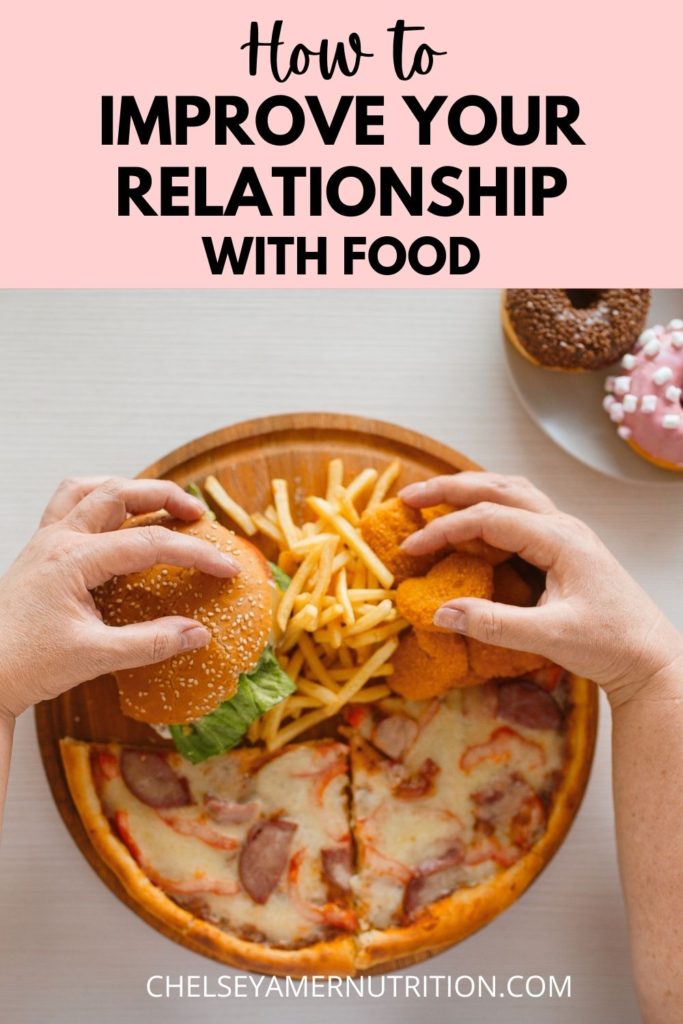The First Step to Improve Your Relationship with Food
So you’re done dieting but don’t know what’s the first step to improve your relationship with food? I’m here to help! Follow these steps to begin improving your relationship with food today.

“I am done dieting!!!”
So you’re giving up dieting… but what’s next?
It can be really overwhelming to declare you’re done with dieting without knowing what comes next.
Sorry to tell you that you will NOT improve your relationship with food overnight. That’s just not how it works.
To go from overwhelmed ex-dieter to confident “I trust myself” eater, here’s the first step to improve your relationship with food.
Before I get into the nitty gritty of the first steps to take to improve your relationship with food, it’s important to know HOW your relationship with food got so messed up.
Essentially, at the root of it you stopped trusting yourself after years of dieting.
Years of dieting, following arbitrary food rules, listening to external influences and cues more than your own internal signals, leads to distrust with your own body.
That distrust is at the root of why you have a poor relationship with food.
Questions you may ask yourself if you distrust your body include:
- Am I hungry?
- What does hunger feel like?
- Can I eat a bowl of cereal without it turning into a binge?
- Can I stop eating when I’m full even though my food tastes really good?
- Or can I eat past my fullness because I want to without feeling guilty?
Why does dieting lead to distrust with your body?
Dieting relies on external rules. For example, “You can’t eat past 7pm.” “Only 1 starchy carbohydrate is allowed per day.” “No grains ever, end of story.”
Diets foster distrust in 3 ways:
- They tell you WHEN to eat. You’re no longer listening to your internal hunger cues, but relying on the CLOCK to tell you when to eat.
- Diets tell you WHAT to eat. You no longer have the power to decide what to eat. Essentially the diet is telling you “you don’t know your body as well as I do.” Hence the distrust.
- Diets tell you HOW MUCH to eat. You cannot decide how much food your body needs to feel energized or satisfied. Instead, you must follow this portion guide and never stray.
But here’s the thing… following arbitrary rules set forth by a diet is a short-term solution for a long-term situation. YOU MUST EAT. Everyday. For the rest of your life.
When you keep following external rules – and jumping from one set of rules to another – you reinforce that you don’t trust yourself.
Add to that the physiological consequences of dieting…
- More binges
- Feeling out of control around food
- Poor blood markers for cholesterol and triglycerides
- Poor body image
- Less satisfaction from eating
- (And more)
But worry not – we can find that trust again to improve your relationship with food!
Here’s the first step to improve your relationship with food:
1. Understand why your current relationship with food is flawed
In order to move forward, we must understand WHY you’re looking to improve your relationship with food.
You see, it’s not so easy as to declare your relationship with food needs fixing as much as to understand how you got to this point.
And I most commonly see several similarities amongst my clients… You…
- Grew up surrounded by messages of dieting
- Constantly battle your weight by restricting your food
- Jump from one diet to another as it promises it will fix the problem once and for all
- Surround yourself with friends who talk about diets and weight nonstop
- Lack trust with your body
- Can’t identify when you’re hungry
- Keep certain foods out of the house
These are just some indications that your relationship with food may be in need of some TLC.
Because years of dieting lead to distrust with yourself. And that’s likely been reinforced by a culture that supports restriction and deprivation, no matter what.
Once you can identify how you got to a flawed relationship with food, you can begin to repair it.
2. Foster body trust by understanding your biological needs
The next step to improve your relationship with food is to learn how to trust your body. At the core of trust is understanding your body on a biological level.
It helps to understand why your body sends you certain signals. They’re not just there for fun. They’re there to help you survive and THRIVE!
The basic biological needs that are important to recognize are:
- Hunger signals
- Fullness signals
- Satiety signals
You can get started with this primer to get in touch with your hunger cues.
I also recorded several videos to help you trust your body and get in touch with these signals. Check them out here:
- The FIRST SIMPLE STEP to Help You Trust Your Body
- Why You Can’t Stop Eating (and Binging) at Night
- How to STOP EATING When You’re Full
- How to Eat Chocolate at Every Meal (if you want to!)
- When to Keep Eating When You’re NOT Hungry and Already Full
Once you’re able to get in touch with your hunger, fullness, and satiety signals you can begin to understand how your body functions a bit better. This is a game changer to improve your relationship with food because you’ll understand why your body is asking for food (and specific foods too).
For example, if you’re craving carbs, perhaps you’ll notice that you’ve waited too long to eat and you’re getting over-hungry a lot. I see this all the time with clients when they first join the Nutrition Training Program.
You may also be craving carbs because your meals aren’t satisfying to you. This is super common amongst my clients because years of dieting have led us to believe we should exist on rabbit food.
In reality, if you eat what sounds good and is satisfying, you’ll turn off your hunger hormones and be able to move on with your day without thinking about food 24/7. This is not me telling you to ignore nutrition. It’s just me telling you to lead with what sounds satisfying to you!
3. Challenge your food rules
The final step of the first three steps to help you improve your relationship with food is to challenge the beliefs you currently have.
I wrote an entire blog post about how to get rid of food rules and I stand by this process.
Challenging your food rules takes time. It doesn’t happen overnight.
If you’re unsure if you have food rules, ask yourself the following questions:
- Can I eat whatever I want, whenever I want?
- Do I judge myself when I eat certain foods?
- Do I keep certain foods out of the house purposefully?
- What beliefs do I have about carbs [dessert, cheese, cereal, candy, etc.]?
- Do I assign morality to food? (i.e. are foods “good” versus “bad”?)
Get rid of food rules by following these steps.
These are just the first steps to improve your relationship with food. If you’re struggling on your own, know that there is support available to you. I’d love to help you finally feel free so you can live your life fully!
Join the waitlist for the Nutrition Training Program.
XO


 Hi there!
Thanks for stopping by! I'm Chelsey, an online Registered Dietitian, recipe developer, budding photographer, and coffee addict! My mission is to help you feel good through food by answering the question "What should I eat?" Let's make nutrition approachable!
I hope you enjoy my personal collection of simple, healthy, food allergy friendly and nutritiously delicious recipes, plus tips and tons of tricks that will help YOU live a nutritionally-balanced life! I look forward to getting to know you better...
Hi there!
Thanks for stopping by! I'm Chelsey, an online Registered Dietitian, recipe developer, budding photographer, and coffee addict! My mission is to help you feel good through food by answering the question "What should I eat?" Let's make nutrition approachable!
I hope you enjoy my personal collection of simple, healthy, food allergy friendly and nutritiously delicious recipes, plus tips and tons of tricks that will help YOU live a nutritionally-balanced life! I look forward to getting to know you better...







